| |
| |
Photographer,
Location |
Images |
Comments |
|
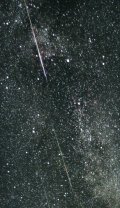
|
Pierre
Martin,
Ottawa, Ontario, Canada
Aug. 12, 2008 |
#1,
#2,
#3 |
I
was able to enjoy the 2008 Perseids under pristine magnitude
6.7 dark skies, with clear horizons. What a fabulous display,
with good numbers of bright meteors, and lots of faint ones
too. I had my two DSLR taking guided 2 minute exposures
for a few hours until dawn. All photos where meteors were
found were then digitally combined to produce these three
images.
Photo
details: Canon
30D with 20mm f/2.8 lens at ISO 640, and Canon Digital
Rebel with 35mm f/2.0 lens at ISO 800). |
|
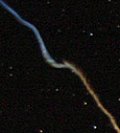
|
Vlad
Dumitrescu,
Pauleasca Romania
Aug. 13, 2008 |
#1,
#2 |
On
August 12th, an exploding Perseid fireball (mag. -5) left
this smoky trail of debris over Pauleasca, Romania. "I
missed the fireball itself, but photographed the debris
twisting in the wind," says photographer Vlad Dumitrescu.
"Later, the trail made a loop and encircled the Pleiades.
Here
is the entire sequence." |
|
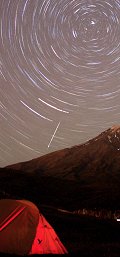
|
Hanif
Shoaei,
Poloor, Iran
Aug. 13, 2008 |
#1 |
Damavand
Mount(The highest peak of iran) & the mountaineers Head
lights trail , Star Trail & a meteor
Photo
details: Canon
40D, 90 min exposure |
|
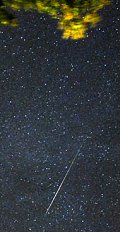
|
Robert
Hoetink,
Enschede The Netherlands
Aug. 13, 2008 |
#1,
#2,
more |
Tuesday
morning was too cloudy in the Netherlands. Wednesday morning
was better. Not every minute a perseid but enough to stay
awake. On the second photo a plane is passing.
Photo
details: Nikon
D200, 1600 ASA, 20 second exposure, focus 2,8, 17 mm.
|
|
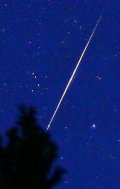
|
Richard
Keen,
Coal Creek Canyon, Colorado, elevations 8950 feet
Aug. 12, 2008 |
#1,
#2,
#3 |
I
took 100 photos between 2:30 and 5 am local time, and found
meteors on at least six of them. One of the two photos here
is the brightest one I caught as dawn was beginning to brighten
the sky. The other is a more typical perseid passing by
Delphinus. Note how the
color changes from green to reddish as the meteor slows
- and cools - during its passage through the atmosphere.
Both images are cropped from much larger image taken with
a 19 mm wide angle lens. The third image is one I sent several
days ago of an early Perseid around midnight on August 3,
taken while I was testing the new camera and lens for the
upcoming shower. |
|
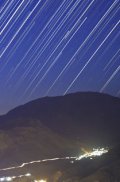
|
Amir
Hossein Abolfath,
Polur, Iran
Aug. 13, 2008 |
#1,
#2,
#3,
#4 |
It
was wonderful this year. The number of bright meteors was
more. |
more
images (Aug. 12-13): from
Chia Peng Han of Macpherson, Singapore; from
Ali Al-Abandi of Qatif, Saudi Arabia; from
Babak Tafreshi of Alborz Mountains, Iran; from
Catalin Timosca of Turda, Romania; from
Geir Øye of Ørsta, Norway; from
Nejc Ucman of Veliki Orehek, Novo Mesto, Slovenia; from
Brian A. Morganti of Bernville, Pennsylvania, USA; from
Siamak Sabet of SOHREIN-ZANJAN-IRAN
|
|